From May 3, the candle light vigil first began in Seoul, in front of Chunggye plaza. There has been a huge group of cramped citizens, angry at the government policy for importing American beef. Also there was a crowd of reporters. Reporters were from everywhere; from the most prestigious news agency all people are aware of, such as MBC, KBS, YTN, to a local college student reporters.
But this time, there was a group which outnumbered them. They were citizen journalists from non-profit organizations and online media broadcasters run by just a one-person for example, Afreeca TV broadcasting room and OhmyNews.
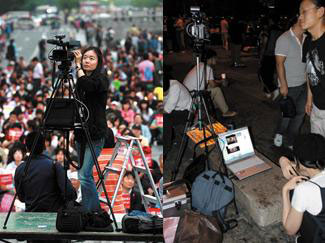
Background of One-Person Media
Wikipedia provided a cyber space in the internet as open communication. Collective knowledge is shared and exclusion faded so the bilateral communication became possible. When online activity is widely used in Korea, the form of activity was performed through blogs. Blog is a composition word of Web, meaning Internet, and Log, which means track record. A blog is a web site, usually maintained by an individual with regular entries of commentary, daily events, or other hypertext material such as graphics or videos. In Korea, Web Log-in Korea, a website which has combined a group of blog users first occurred in Dec 2001, and evolved into Cyworld's mini hompi, becoming a national one-person media today.
NHN, owner of Naver, and Daum communications applied a new blog service Tatter tools format in each of them. It is a format for easy creation of blogs invented in Korea in 2004. Tistory, another form of blog generator in 2006 followed. The blog service is beginning to apply in every famous online search engine in Korea.
The famous Afreeca TV BJ (Broadcasting Jockey) Rakoon, Na Dong-hyuk, said, "Korean one-person media is in the ahead of the world. Compared to youtube and Google blog and some famous homapages in foreign country, no foreign country is doing various and lots of one-person media than Korea."
Social Influence Confirmed
Through the candlelight vigil in 2008, one-person media strengthened its form and functioned as an online journal effectively in individual blogs, online cafes, and every bulletin boards and also on OhmyNews, Afreeca TV and Daum Agora.
OhmyNews, with a company motto as, "Every citizen is a reporter", was the most successful company of online journalism at that time. In 2002 and 2004 it was the first golden age of OhmyNews, when they covered the huge candlelight demonstrations sparked by the accidental deaths of two innocent middle school girls, Hyo-soon and Mi-sun by American soldiers in Korea. In 2004, there was another giant candlelight demonstration in Ghwanghwamun. It was a protest for the impeachment decision of former President Roh Moo-hyun.
Since then, the blogs of every internet portal site including all traditional news companies began to make up news platforms. Readers preferred to visit portal sites to browse news. Newspaper readers felt more comfortable when they visit portal sites than visiting independent internet news sites. Again in 2008, it was not just OhmyNews that broadcasted online and made the candlelight vigil public. Everything followed as OhmyNews motto inspired.
There were citizen journalists and BJs everywhere. Foreign newspaper media started to call this "Street journalism" Street journalists no longer depended on traditional media. They acted as media themselves. Traditional media was in a hurry to catch up with the BJs. Even the administrator of so-called the biggest online debate site, Daum's Agora platform, could not control them. The effect of this online journal is quite tremendous.
The Newspaper of Journalist Association of Korea reported that in the KACA (Korean American Communication Association) 30th anniversary seminar, Oh Yeon-ho, the CEO (Chief Executive Officer) of OhmyNews said, "One day, I found out that over one million visitors watched our live coverage, soaring to the highest record. Page views had increased about five times. The most surprising experience was the spontaneous, unsolicited payments from viewers. Viewers expressed their thanks to OhmyNews coverage of the demonstrations by giving unrequested subscription payments. Each day, thousands of payments of two or three dollars came in through our tip jar and mobile phone payment system. We received about 170,000 dollars by nearly 30,000 people."
At the field, one of the most intrusive citizens broadcasting team in Afreeca TV (the H news team) told about the influence of online broadcasting and journalism. "About 10 BJs are running their own one-person media broadcasting team."And he said, "Every day is a blessing for me. People come out to the street to make use of their rights as their nation's citizens. I heard people from other places try to participate with the support of food and beverages." He said that in the recent YTN case, the employed gangs could not dare even touch us because, at that time, they were currently broadcasting to whole nation supporters.
Professor Park So-ra of HYU, Department of Newspaper and Journalism, commented about the effect of the creation of one-person media. "Actually, the video took by one-person media was quite influential because they are selected by numerous users."
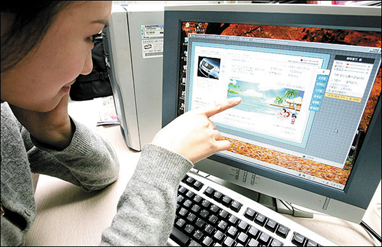
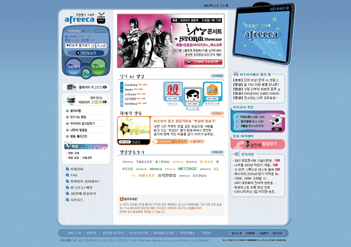
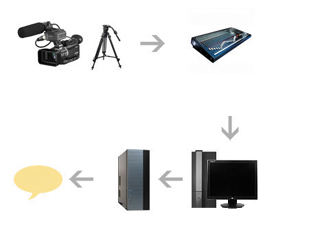
Of course, the online journalism through one-person media stretched its arms to the right function of democracy in Korea. As many are aware that the internet was an outcome of the US military. When it came to reality, it sometimes created unexpected results. In Korea, the Internet is the most essential ingredient in a course of establishing a real democracy.
In the short 60 years history of Republic of Korea, freedom of speech has been under pressure and manipulated for a quite some time. During the past 10 years, internet technology was used as a tool of promoting extension of freedom and democracy. And it is proven with a fact of the recent candlelight vigils.
Oh Yeon-ho said in the KACA (Korean American Communcation Association) seminar, "Korean people showed how online and offline activities and communities can work together to create new synergies. They debated in online communities and took to the streets and then debated the results back to the online communities. And this changed government policies."
Professor Park also commented, "I think the level of Korean democracy is immature and it is learning by trial and error. We should take more care on this and see how it changes our democracy in the near future." But the current circumstance has its value because it listens to social minorities, deals with problems which traditional media cannot even refer to, and work as a supervisor of governments.
Aspect from Traditional Media and Fairness
The famous Afreeca TV BJ, Na Dong-hyuk (www.afreeca.com/rkparadigm) said "In recent days, traditional media are connected with these professional bloggers and Internet Broadcasting BJs. They offered sources by one-person media, and protect them to be more liberal in gathering news in the scene." But raditional media do not always welcome the one-person media. Surely, the system, including one-person media, which enables everyone to upload any information they gathered and opinion is also dangerous because they show less responsibility. So, the traditional media is skeptical about the social responsibility shown by one-person media outlets.
Social responsibility ranks higher than quickness. The professional reporters are trained and they do have ethical reputations in their professions. It does not build up in a day. it is gained through numerous experiences. The few who trigger problems are just information spreaders. Professor Park said, "Though one-person media thrives, there must be ethical responsibility about how its creation affects others' existence."
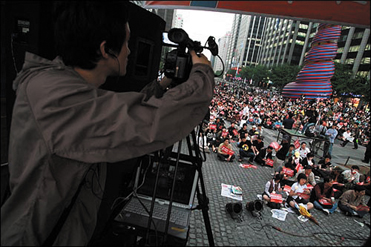
It is already a new kind of journalism that a person who has professional knowledge in that field delivers his content to the public online. In America, a situation occurred when a power blogger influences more readers than major newspaper sites. As a solution to this problem, Choi Jin-soon, a reporter for the Korea Economic Daily said, "Social concern on this matter should be widen. Journalism education programs need to be extended and a conflict may occur among the groups which have opposing sides. But the important thing is that we need social awareness to be matured." Then what is necessary to raise a mature social consciousness? Anyone can express their idea liberally and be criticized in front of a number of users. Then the idea can be altered based on the feedback. "This circulation is very important in making a mature democracy in our society. That makes fine public opinion online," professor Park added.
Spiral of Silence Theory explains that one in the minority is less likely to express his idea freely if his idea is not the one in the majority. This theory also applied online. So the readers should always think about the idea of social minority not just because they are just minor but as a different point of view.
One of Afreeca TVs' most intrusive broadcasting team (the H news team) said, "It is true that we broadcast slightly biased for citizens but newspapers such as Chosun, Joongang, and Dong-a dailies (Three main conservative Korean Daily Newspaper) do have print bias to get public opinion to stand on their side. On the other hand, one-person media broadcast the various sides equally. But we try to observe and seek fairness through holding an open discussion, often." Traditional media also needs to change their attitude. They think it started to crack their reputation because the position of one-person media has risen rapidly through the candlelight vigil. Thinking pessimistically about one-person media does not help in solving the issue.
Difficulties Occurred in the Spot
There is discrimination between the traditional and citizen media. Reporter Choi Jin-soon said, "The traditional media needs to find mutualism with the one-person media. The criticism and disbelief against traditional media should be revised through reporters in deep consideration. They have to admit the fact that this mutualism would lead them to a new development power." The famous Afreeca TV BJ Rakoon, Na Dong-hyuk said, "Cleary, one-person media can not be superior than traditional media because there are many difficulties in gathering news in the scene."
A power blogger named Park Hyung-joon who uses the ID name of Cheonhcheonhangro emphasized the prejudice against one-person media in which the government and polices need to be modified. He said, "I was threatened by them three times when I was in the spot. But I was relieved because I had a press card which made me looked like a reporter. But broadcasters without the press card were oppressed. I think this government had the same idea of what governments had in the 70's and the 80's. They are not catching up to the current online circumstances."
The famous Afreeca TV BJ Rakoon, Na Dong-hyuk said "As yet, the legislation on one-person media has not been built, the government is making the expedient laws not the fundamental ones. This current government policy influences on the development of one-person media in negative way."
Change is Necessary
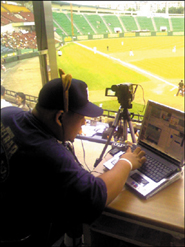
The Need of Change for College Students in One-Person Media
In the past social movements, in recent modern Korean history, demonstrations for democracy were led not by social leaders but by the young adults aged 19 to 26, which is the equivalent age of college students. University is supposed to function as a barrier gate for a society and educate students to be more adequate. In the initial period of candlelight 2008, there were no college students on the scene. They came in later as they were busy for their so-called employment applications.
The leader of most intrusive broadcast team in Afreeca TV describes the unique social positional traits. They are familiar with online media; they have enough time to figure out social problems and their openness to brand-new media.
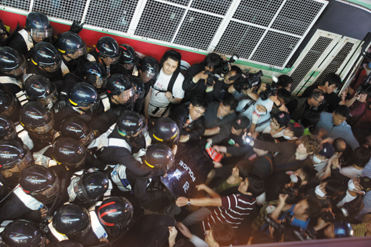
Another important manner is respect and responsibility in attitude. Cyber space is an anonymous space where nobody knows one another unless he or she identifies oneself. Professor Park, said, "Now, everyone can be a main body of communication. So the responsibility and ability of what the reporter had in the past, is important especially for students who are in the search of learning information from other users and him." Choi Jin-soon said, "College students are learning. They need to have more yearning for learning. They should not be self-esteemed. They should take it as relief that they can create new content that is different from other points of view because they are college students."
Way to Get Better
One-person media has its value on fairness, various opinions, responsibility, and reliable sources. Numerous and quick broadcastings became possible and more importantly it is truly influential to the future. Broadcasters from the scene admitted that even their fairness should be improved and they find their way holding such as open conferences.
Lastly, challenge is crucial. An online journalists' path is rough. They may become miserable by social prejudice, neglected by the press or intellectuals. But they need to keep trying. They need to experience as much as they can. Even though online journalist's work may be incomplete, they need to realize that it is a new form of media under the process of a whole new communication.
BJ Rakoon, Na said, "One must be able to take responsibility about what he has said and done. One does have the freedom of speech with his intentions. But, at least one must recognize the fact that one can be punished if his work has been manipulated from the objective fact, which could possibly bring social chaos and mental and physical personal damage."
Broadcasting experts in the spot say more social interest on the part of college students are needed for a real, well communicative society. Professor Park said, "To be a more communicative society, it may take a little while and education. And our next generation could be well communicative. Though it is hard, it must be gone through."
INTERVIEW
A Reporter's View on One-Person Media
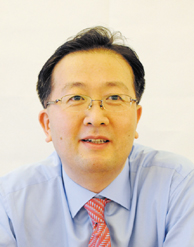
Choi Jin-soon
Reporter
Korea Economy Daily, Department of Planning & Coordination, Media Section
How would a reporter from traditional news company think about the situation threatening their dominant area in newsgathering? Choi has a lot of opinions about one-person media and through a lot of experience in the academic, he also listens to what citizen thinks. It seemed like he has some solutions to this matter. The Hanyang Journal asked how he thinks.
Q What is your perspective on personal reporters and online journalism that took place in the recent candlelight vigil? We would appreciate it if you could explain this question related to the characteristics of the candlelight vigil.
A In the recent candlelight vigil, it is being evaluated not as a political purpose but as a group-gathering who realized the problem in the current situation. In other words, people who had interest in a certain issue gathered in one place to express their thoughts and feelings. Thus, this event is not completely new. Simply the stage changed but discussing one's opinion with others in an offline environment can often be seen. For example, there is not much difference between that and chit-chatting about a certain movie or famous celebrity with friends and families. However, this gathering has been an uprising problem, a limited field of common hobby, prevalence, or preference. The recent candlelight vigil due to US beef negotiations and personal reporters has focused on public issues, which is what "journalism"is all about. They supervised "power"and pointed out problems. Not only that, but they reported scenes or imaged that the mass media did not cover or distorted. Their characteristics were absolutely alternative reporters. They have formed a network by diversely distributing their personal contents. It has nearly been a "Network Journalism”.
Q Why do you think the press does not see this in a positive way? If this whole situation is seen in the journalism point of view, isn? reporting quicker in a variety of angles and reporting more in quantity suppose to be appropriate? (like the issue on distributing the video clip of riot police? excessive force)
A Basically, it originates from their dual attitude towards one person media. First of all, the press accommodates these facts. In the media websites, they have made a UCC (User Created Contents) channel tempting them. And in some articles, their contents and opinions are introduced. In another perspective, they say that personal reporters are always not prepared enough, emotional, and impromptu, saying they are dangerous. Thus, the press does not rely on their work and devalues their content. However, in some cases, the press is taking in the personal reporter's reference as reliable content. In some newspapers during the candlelight vigil, they modified some of their tone. In the commercial boycott, they proved that they have the power. In one way, they said that people needed to get together whereas in another way, they needed to control the people so that they do not grow too big. In other words, the press is not aware of the characteristics of the internet platform. For example, even though they have a certain tone in the newspaper, they need to have a different strategy in be able to manage all the different opinions in the internet version.
Q In order for personal reporters to grow, what kind of effort is required?
A For personal reporters to grow, firstly, complete content is necessary. It is difficult to gather news sources on the spot but high quality content is necessary to deliver precise information. Incomplete articles by personal reporters will hold back the possible development of personal reporters.
Secondly, reliable information needs to be guaranteed. The content of individual uploads need to be clear from any fault in morality. Thirdly, various opinions need to be formed. There has been recently a conflict between the CEO Oh Yeon-ho of OhmyNews and few portal application in the blogs. It was whether the blogs under portal sites can continue to exist. Portal sites are commercial business and Oh's opinion is persuasive in a way that blogs cannot stand neutral on public issues. A platform that collects different opinions needs to be updated constantly. Besides this case, personal reporters?identity needs to be organized. Blogs have the characteristic of being able to upload one's opinion freely, but it does not fit the media's characteristics if single opinion repeats itself. There is not always a must for blogs to present current events or public issues but it needs to prove what the contents are and whether it is presented in a uniformed way. This is the way personal reports can develop into a responsible medium and be reliable.
Q What does it mean by amateur press being the professional press and is it possible for online journalist to become a professional one?
A OhmyNews is organized with citizen reporters and they are developing into a press. Few influential bloggers act as professional reporters. The problem is that in order for amateur journalists like blogs to grow, our society needs a mature attitude toward the new voices of these people. For example, for citizen journalism to stabilize, previous media and pre-existing press need to cooperate. Their voices need to be acknowledged. In addition, social interest is necessary. Education in journalism is required. There may be some groups who want to avoid certain public issues to be brought out in the open. There may be attempts to limit uncontrollable networks. This can by the future conflict that might arise. What is important is that not only bloggers but also our society's journalist need to have rational wisdom to guide a matured medium.
Q What positive effect do press groups such as the personal reporters and online journalism have in democracy?
A Firstly, it has an optimistic view of being able to present a social minority's voice. Secondly, issues the press cannot deal with can rise. Thirdly, they have actual effect such as criticizing, observing, etc. on various fields. But, imprecise information or emotionally over-reacting to some issues can be put out. However, the network has the ability to regenerate or elaborate on good contents whereas dropping bad ones. And a variety of gate-keeping (recommendation, reports, etc.) systems is crucial in allowing it. Networks that are run by collective intelligence can present a dramatic online journalism for its positive characteristics.
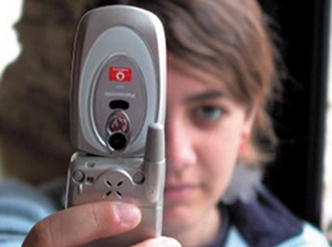
A College students are learning students. They need to be able to focus on learning. They should not have pride and prejudice just because they can apply networks or have the ability to apply new techniques. They need to produce new information in that sense. They need a courteous attitude such as "I think this is this, I think that is that, do you have any other ideas?"And they should not simply imitate professional reporters or intellectuals. Generic imitation is seen as a deception. A college student-like vision is essential. Because they are college students, they can have different perspectives and content. For example, it may be good to say historical facts related to whether 60th anniversary of the foundation is correct or not but it is better to express college student? viewpoint. College student's need to approach the internet public opinion as a way to learning something in it. Having a biased, emotional perspective on a certain theory is not right. It would be better to see things after taking a step back on an issue and in an unbiased way. Other advice I can give is that a historical vision is necessary. Not only seeing things in the short term but visualizing things for the society's future or our nation's future is taking one step ahead.
Q For personal reporters and online journalists to stand up for themselves, what is needed for them to do?
A Firstly, for online journalists, they need to be capable of storytelling through the multi-media. Simply writing articles are good but they need to know what is the most effective way for them to effectively express their news. That can be done by one minute video clip, tables or images, and photos. Flash media is also good. What is important in a new story is also not only taking effect of online characteristics of the media but managing content that can bring up as many people who sympathizes the content. Secondly, it needs to be mutual. Communication needs to exist endlessly. Analyzing one's own theory without any gain of sympathy from others, is unnecessary. Thirdly, the content needs to be managed continuously. Re-reporting news, revising other's opinion and questions is necessary. Lastly, challenge is crucial. An online journalist's path is rough. They may become miserable by social prejudice, neglected by the press or intellectuals. But they need to keep trying. They need to experience as much as they can. Even though online journalist's work may be incomplete, they need to realize that it is a new form of media is under the process of a whole new communication.

